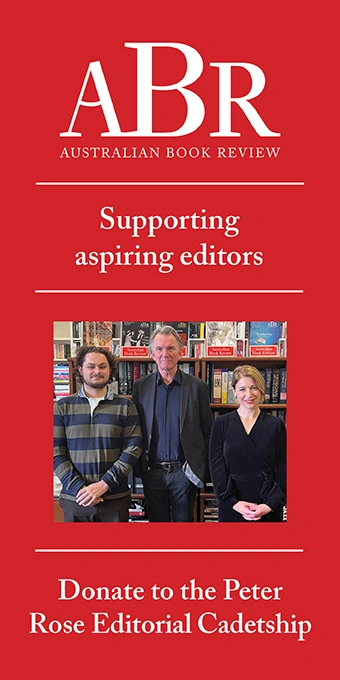Georgina Arnott

Georgina Arnott is Editor and CEO of Australian Book Review. She was Assistant Editor at ABR from 2022 to 2025. She is the author of The Unknown Judith Wright (UWAP, 2016), shortlisted for the National Biography Award, Judith Wright: Selected Writings (La Trobe University Press, 2022), and numerous book chapters, essays, and articles in the field of Australian literary studies, history and biography, as well as the writer/producer of an episode of Radio National’s History Listen. Georgina is a former judge of the National Biography Award (2018, 2019) and the Calibre Essay Prize (2025), an ABC Top 5 Humanities Scholar (2021), and a Rockefeller Archive Center fellow (2024).
University of Western Australia Press should be commended for recognising a significant gap in Australian literary scholarship: a book-length study on the work of Tim Winton. Aside from Tim Winton: A Celebration (1999; not a critical work), and Michael McGirr’s Tim Winton: The Writer and His Work (1999), written for young readers, there have been no major studies of his work and little critical ... (read more)
More than a journal, Indigo represents a vibrant creative writing movement based around the Fremantle Arts Centre. Submissions are accepted from those who currently reside in Western Australia or who have lived there for at least ten years. But why start a journal for Western Australian writing alone? Is there something distinctive about Western Australian experience? Certainly, the way sandgroper ... (read more)
Here we have one brand new literary journal, Etchings, and one which, by comparison, is practically geriatric: Famous Reporter. There is now a proliferation of literary journals, and SPUNC (Small Press Underground Networking Community) has emerged to advance their cause. We know that mainstream publishing is producing less diverse material, and that it is increasingly not Australian. The vast majo ... (read more)
In August 1823, Quamina Gladstone and his son Jack led an uprising in the British sugar colony of Demerara where they were held as slaves. The men believed that the British parliament had voted to abolish slavery and that this was being concealed from them. The colonists quashed the rebellion with firepower, torture, and execution. Something had happened in Britain’s parliament: the Anti-Slavery ... (read more)
Switched On showcases the careers of twenty-nine ‘influential’ women who work in the media. Catherine Hanger, interviewer and former editor of Vogue Australia, believes that Switched On ‘connects two major spheres of influence in our society – the media and the women who work in it’ – and argues that the influence of these women is ‘very powerful indeed’. While the title promises ... (read more)
In 2007, Britain’s Royal Mint issued a £2 coin commemorating two hundred years since the Act for the Abolition of the Slave Trade, the zero in ‘1807’ appearing as if a broken link in a chain. While interrupting the notorious transatlantic trade, the Act did not end slavery itself – that was achieved, at least in parts of the British world, with further legislation in 1833 that outlawed en ... (read more)




